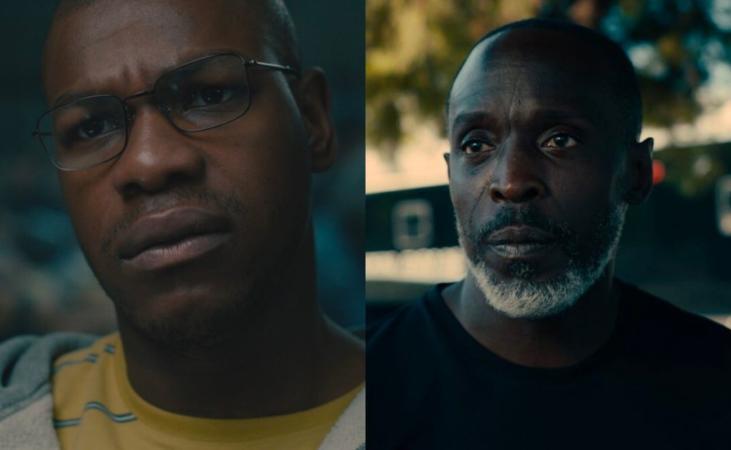This film was screened as a part of the 2021 Sundance Film Festival.
892 tells the real-life story of Brian Easley, a veteran who was killed by police after he threatened to bomb a bank in 2017. Easley was a former marine who took two hostages in a Wells Fargo in Atlanta to get the disability check that he was denied and to awareness to what he was going through. The film, directed by Abi Damaris Corbin and co-written by Corbin and Kwame Kwei-Armah, grapples with some important ideas about America. This includes real problems like soldiers returning home to a country that sees them as disposable, and the lack of empathy shown towards Black people in distress. John Boyega delivers a powerful performance as Easley and holds together a film that wants to be more than a standard thriller, but struggles to balance the story it wants to tell and the themes it ultimately just lightly touches on.
Easley is at the end of his rope, and Boyega plays into the desperation with real weight and a distinct politeness and respectfulness that the real-life Easley was described with. Easley’s personality, his disability (that is only hinted at in the film) and his politeness through it all, endear him and his story to the bank tellers and hostage negotiator until his desperation breaches through. He explodes when he feels everything coming down around him and the feelings of hopelessness come through.
The film strays away from really diving into the circumstances that led to such a desperate display, instead only touching on the trauma caused by what Easley went through in the military and the struggles he continued to face once he returned to civilian life. The film flashes back occasionally to his time as a marine and being violently detained at the Veterans Affairs office, setting up his grievance but not exactly making any bold statements. Boyega makes do with some of the film’s problems with a real showcase performance that is captivating enough to carry large swaths of the film.
The interactions between Easley and the bank tellers he takes hostage, played by Nicole Beharie and Selenis Levya, are effective and the strongest examples of the film displaying the absurdity of what’s happening and how heartbreaking it is that Easley has hardened himself to go through with this plan for just about $900. Beharie and Levya’s performances show real fear in what’s going on but also the compassion and recognition that this is a good man pushed to the brink. The film has moments of levity that befit Easley’s characterization and it also include sparse lighter moments that don’t clash with the grave subject matter. For example, there is a point when Boyega answers the bank’s phone and takes a message for someone concerned with an overcharge, in a truly funny exchange.
There is exciting and effective filmmaking, with quick and dramatic cuts that plays into the thriller aspect of the story. The first scenes in the bank are staged and shot well as the bank’s employees slowly realize what’s unfolding, setting up the dynamic between Easley and the two women who remain in the bank as hostages.
The beginning of the film excels in setting up the why, but when it ventures outside the confines of the bank, 892’s message gets lost as the media and police arrive on the scene. The Swat response and the media descending on the bank seem so distant from what’s going on inside. The threats seem so far away, and there is no real reaction or development on the direness of what’s actually happening. The procedure taking place by the police is disconnected from the drama of the story and is positioned for the inevitable tragic end of the story that everyone knows is coming. The police response mishandling the situation is just a means to an end, but it’s partly saved by Michael K. Williams-portrayed hostage negotiator, Eli Bernard.
Williams, in his last on-screen role, shines with material that isn’t fully fleshed out, showing his ability to pull emotion out of anything and imbue his character with the empathy and understanding only he could, delivering on much of what the film wants to do but just couldn’t quite get there. His back and forths with Boyega, who is tethering on the on edge, while Williams is a calming force that knows his words carry weight, work well as both performers do their part in trying to elevate the thriller. The characters are positioned as having similar experiences, both being former marines. That relatability allows Easley to open up in some of the best scenes in the film, showing the emotional toll of everything that is going on and that preceded his decision to threaten the bank.
The film’s ending isn’t executed well, or with the attention and significance it deserves, playing to the shock of a story that is known and let down by the police and outside forces being the weakest parts of the movie. The ending seems latched on to the film, as there was no real reckoning with any of the central ideas about the American experience that were in play, making it just a tragedy of a desperate man and leaving the audience to fill in the blanks on how and why the tragedy occurred in the first place.
The performances boost aspects that wouldn’t have worked without the likes of Boyega and Williams. 892 is a solid thriller, but walking away from the film leaves the feeling that it could have gone deeper into the themes it only brings up and deeper into the systems and the circumstances that led Easley down the path of such desperation– things it wanted to explore but ultimately failed to do.
892 premiered at the Sundance Film Festival and has not been acquired yet.

